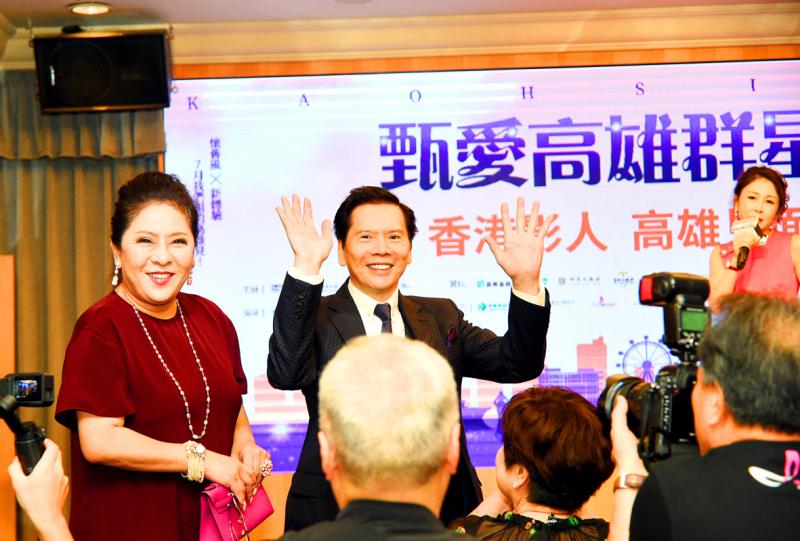Hong Kong entertainment tycoon Charles Heung’s (向華強) application for Taiwanese residency is likely to founder due to his ties to Beijing, a source connected to the national security establishment said.
Heung is chairman of China Star Entertainment (中國星). The former actor is perhaps best known for playing a supporting role in the 1989 film God of Gamblers.
Heung filed the residency application on the grounds that his wife, Tiffany Chan (陳嵐), is Taiwanese, and his family have been lobbying lawmakers to facilitate his immigration bid, said the source, who spoke on condition of anonymity.

Photo: Chang Chung-yi, Taipei Times
However, national security officials believe that Heung is a potential security risk, the source said.
As a pro-Beijing celebrity in good standing with the Chinese Communist Party and a fortune in the billions, Heung has no reason to leave Hong Kong, the source said.
When China’s National People’s Congress promulgated the National Security Law in Hong Kong, Heung was one of 3,000 celebrities to sign a public statement supporting the controversial legislation, the source said.
Heung’s family has deep ties to Hong Kong’s largest criminal organization, the Sun Yee On, the source said.
Another issue is that Heung’s son Jackie Heung (向佐) is a known member of the National Committee of the All-China Youth Federation, an organ bearing a strong connection to the Chinese Communist Youth League, they said.
Writing on social media during anti-extradition bill protests in Hong Kong last year, Chan called for the security apparatus to ban masks, accusing the protesters of “acting like animals and demons under the cover of masks,” the source said.
Being eligible for residency does not mean the application will be granted, the source said, adding that the evaluation process protects national security and the interests of Taiwanese.
Economic Democracy Union convener Lai Chung-chiang (賴中強) yesterday said that the government should approach the issue of Hong Kong immigrants from the perspective of defending Taiwan’s democratic way of life.
“A powerful player of Hong Kong’s entertainment world could import China’s political censorship if they are allowed to develop their career in Taiwan,” Lai said. “This has the potential to transform Taiwan’s entertainment industry in a worrisome direction.”
A spokesperson for the Taiwan-based Hong Kong Outlanders, who uses the pseudonym Justine, said that Taipei should reject the residency applications of Hong Kongers who support Beijing, or have an institutional affiliation to the Chinese government or military organizations.
“Such measures are necessary to protect the safety of Taiwanese and Hong Kongers living in Taiwan,” Justine said.
Democratic Progressive Party Legislator Fan Yun (范雲) said that Taiwan must look to its national security as the nation extends its friendship to Hong Kong.
“When Hong Kongers seek immigration to Taiwan, whether it is on grounds of family or as an investor, the government should look at their record, examine their potential ties to organized crime and be mindful of the national security angle,” Fan said.

A magnitude 7.0 earthquake struck off Yilan at 11:05pm yesterday, the Central Weather Administration (CWA) said. The epicenter was located at sea, about 32.3km east of Yilan County Hall, at a depth of 72.8km, CWA data showed There were no immediate reports of damage. The intensity of the quake, which gauges the actual effect of a seismic event, measured 4 in Yilan County area on Taiwan’s seven-tier intensity scale, the data showed. It measured 4 in other parts of eastern, northern and central Taiwan as well as Tainan, and 3 in Kaohsiung and Pingtung County, and 2 in Lienchiang and Penghu counties and 1

FOREIGN INTERFERENCE: Beijing would likely intensify public opinion warfare in next year’s local elections to prevent Lai from getting re-elected, the ‘Yomiuri Shimbun’ said Internal documents from a Chinese artificial intelligence (AI) company indicated that China has been using the technology to intervene in foreign elections, including propaganda targeting Taiwan’s local elections next year and presidential elections in 2028, a Japanese newspaper reported yesterday. The Institute of National Security of Vanderbilt University obtained nearly 400 pages of documents from GoLaxy, a company with ties to the Chinese government, and found evidence that it had apparently deployed sophisticated, AI-driven propaganda campaigns in Hong Kong and Taiwan to shape public opinion, the Yomiuri Shimbun reported. GoLaxy provides insights, situation analysis and public opinion-shaping technology by conducting network surveillance

Taiwan is gearing up to celebrate the New Year at events across the country, headlined by the annual countdown and Taipei 101 fireworks display at midnight. Many of the events are to be livesteamed online. See below for lineups and links: Taipei Taipei’s New Year’s Party 2026 is to begin at 7pm and run until 1am, with the theme “Sailing to the Future.” South Korean girl group KARA is headlining the concert at Taipei City Hall Plaza, with additional performances by Amber An (安心亞), Nick Chou (周湯豪), hip-hop trio Nine One One (玖壹壹), Bii (畢書盡), girl group Genblue (幻藍小熊) and more. The festivities are to

Auckland rang in 2026 with a downtown fireworks display launched from New Zealand’s tallest structure, Sky Tower, making it the first major city to greet the new year at a celebration dampened by rain, while crowds in Taipei braved the elements to watch Taipei 101’s display. South Pacific countries are the first to bid farewell to 2025. Clocks struck midnight in Auckland, with a population of 1.7 million, 18 hours before the famous ball was to drop in New York’s Times Square. The five-minute display involved 3,500 fireworks launched from the 240m Sky Tower. Smaller community events were canceled across New Zealand’s